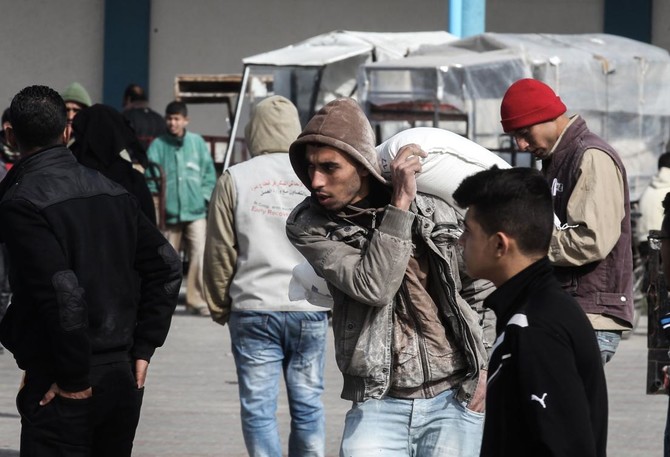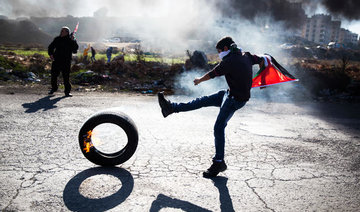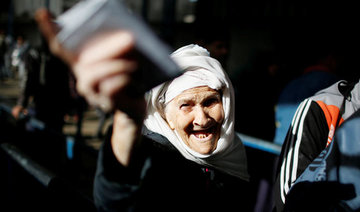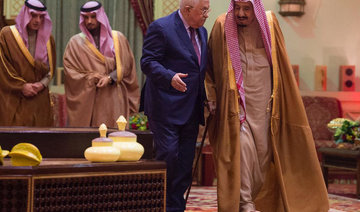LONDON: The Arab League and aid agencies on Wednesday warned of the devastating consequences of a US decision to freeze $65 million of Palestinian refugee funding.
The outcry came as the Palestinian president Mahmoud Abbas again blasted Donald Trump’s “sinful” decision to recognise Jerusalem as Israel’s capital.
Washington said on Tuesday it would provide $60 million to the UN Relief and Welfare Agency but would hold back a further $65 million. The US State Department said UNRWA needed to make unspecified reforms.
Both the head of the Arab League and the chief of the UN agency warned that holding back the money would exacerbate hardship, and effect education and health for some of the region’s most vulnerable people.
More than half a million boys and girls in 700 UNRWA schools could be affected by the fund cut, as well as Palestinian access to primary health care.
The cut in funding will effect Gaza in particular, where UNRWA helps much of its population of 2 million.
UNRWA’s Commissioner-General Pierre Krähenbühl said he would appeal to other donor nations for money and launch "a global fundraising campaign" aimed at keeping the agency's schools and clinics for refugees open through 2018 and beyond.
"At stake is the dignity and human security of millions of Palestine refugees, in need of emergency food assistance and other support in Jordan, Lebanon, Syria, and the West Bank and Gaza Strip," Krähenbühl said.
He also warned that the move risks further instability in the region by contributing to the conditions that feed extremist ideologies.
In a Twitter post earlier this month, Trump said that Washington gives the Palestinians "HUNDRED OF MILLIONS OF DOLLARS a year and get no appreciation or respect.”
Trump added that "with the Palestinians no longer willing to talk peace, why should we make any of these massive future payments to them?"
The US State Department said Washington had been UNRWA’s single largest donor for decades and insisted the decision to freeze the funding was taken to encourage other countries to help pay for and reform the agency.
Some US official had wanted to cut all aid to Palestinians while others were concerned about the humanitarian and diplomatic fallout.
Arab League chief Ahmed Aboul Gheit said halting the money was aimed at wiping out the whole Palestinian refugee issue.
"This decision affects the education and health of Palestinians and aims to eradicate the question of refugees," he said.
Hanan Ashrawi, a senior official in the Palestine Liberation Organization said the White House was "targeting the most vulnerable segment of the Palestinian people".
Israeli Prime Minister Benjamin Netanyahu, who has called for a gradual cut in UNRWA funding and transferring its responsibilities to the UN global refugee agency, said he supported the move.
The freeze comes aid outrage among Palestinians over Trump’s decisions to recognise Jerusalem as Israel’s capital. Palestinians want the city to be the capital of their future state and east Jerusalem has been illegally occupied by Israel since 1967.
"Jerusalem will be a gate for peace only if it is Palestine's capital, and it will be a gate of war, fear and the absence of security and stability, God forbid, if it is not," a furious Mahmoud Abbas said at a conference in Cairo on Wednesday.
The Palestinian president, who initially described the decision as a "slap of the century," said the US has disqualified itself from continuing as a broker in any Israeli-Palestinian negotiations.
Netanyahu threw fuel on the fire on Wednesday by saying he was certain the US Embassy in Israel would be moved to Jerusalem sometime this year.
Moving the embassy was a key Trump foreign policy election pledge but US officials have said it is unlikely it would move from Tel Aviv before the end of the end his term in office.
The Cairo conference was organized by Al-Azhar, the primary seat of learning for the world's Sunni Muslims.
Earlier, Al-Azhar's grand imam and Egypt's top Muslim cleric, Sheikh Ahmed Al-Tayeb, described Trump's Jerusalem decision as “unjust”. He said it must be countered by a revival of awareness of the Palestinian question.
— With AP, AFP and Reuters
Warnings over ‘devastating’ US decision to freeze Palestinian refugee funding
Warnings over ‘devastating’ US decision to freeze Palestinian refugee funding

Israel yet to respond to French Lebanon proposals, French ministry says

- The written proposal also looks at long-term border issues
PARIS: Israel has not given a response to France on Paris’ proposals to reduce tensions between Israel and Lebanon’s Iran-backed Hezbollah, France’s foreign ministry spokesperson said on Thursday.
Israel and Hezbollah have been engaged in escalating daily cross-border strikes over the past months — in parallel with the war in Gaza — and their increasing range and sophistication has raised fears of a wider regional conflict.
France has historical ties with Lebanon and has proposed written proposals to both sides that would see Hezbollah’s elite unit pull back 10 km (6 miles) from the Israeli border, while Israel would halt strikes in southern Lebanon.
Foreign Minister Stephane Sejourne went to both Lebanon and Israel in April to push France’s efforts, and Israel’s foreign minister was in Paris earlier this month. Lebanon’s foreign minister was in Paris for talks on Wednesday.
“We have had a relatively positive response from the Lebanese, but I think we have not had any return from Israel at this point,” Christophe Lemoine told reporters in a daily briefing.
The written proposal also looks at long-term border issues and had been discussed with partners including the United States, which has its own efforts to ease tensions and exerts the most influence on Israel.
The Shiite Muslim Hezbollah has amassed a formidable arsenal since a 2006 war with Israel and since October thousands of people on both sides of the border have been displaced by the clashes.
US envoy condemns attacks on Western-linked brands in Baghdad

- A stun bomb exploded at 1:20 am in front of a dealership of the US construction equipment company Caterpillar
- Ten minutes later, a blast went off in front of the Cambridge Institute in nearby Palestine Street
BAGHDAD: The US ambassador to Iraq denounced attacks Thursday targeting Western-linked brands in Baghdad this week, as anger grows across the Middle East over Israel’s war in Gaza.
A stun bomb exploded at 1:20 am in front of a dealership of the US construction equipment company Caterpillar in the Jadriyah neighborhood of Baghdad, the Iraqi security forces said.
Ten minutes later, a blast went off in front of the Cambridge Institute in nearby Palestine Street, which a resident identified as a likely Iraqi-owned language learning center.
On Sunday, a makeshift bomb was thrown at a branch of the US fast-food chain KFC, causing minor damage. The next night, masked men broke into another branch, smashing glass.
“We condemn recent violent attacks against US and international businesses,” the US ambassador to Baghdad, Alina Romanowski, said on social media platform X.
She urged the Iraqi government to “conduct a thorough investigation, bring to justice those who are responsible, and prevent future attacks.”
“These attacks endanger Iraqi lives and property, and could weaken Iraq’s ability to attract foreign investment,” the US diplomat added.
The Iraqi security forces said Thursday’s attacks, whose motives remained unknown, did not cause any damage or injuries, adding they were a “desperate attempt to harm Iraq’s reputation.”
After the KFC attacks, security forces said they had arrested several suspects.
Since the war in Gaza started in October, a boycott movement spearheaded by pro-Palestinian activists has targeted major Western brands, such as Starbucks and McDonald’s.
Iraq does not recognize Israel’s statehood, and all of its political parties support the Palestinian cause.
Earlier this week, influential Iraqi cleric Moqtada Sadr renewed his calls to close the US embassy in Baghdad “through diplomatic means without bloodshed,” after an Israeli strike killed dozens of civilians in a camp in Gaza.
Syria’s main insurgent group blasts the US Embassy over its criticism of crackdown on protesters

- The group said Washington should instead respect protesters at American universities who have demonstrated against the war in Gaza
- The statement by the US Embassy in Damascus came after months of protests against Hayat Tahrir Al-Sham
IDLIB, Syria: The main insurgent group in rebel-held northwest Syria blasted the US on Thursday over its criticism of a crackdown on protesters in areas outside government control.
The group said Washington should instead respect protesters at American universities who have demonstrated against the war in Gaza.
The statement by the US Embassy in Damascus came after months of protests against Hayat Tahrir Al-Sham, or HTS, in Syria’s northwestern Idlib province by people opposed to the rule of the group that was once known as the Nusra Front, the Syria branch of Al-Qaeda. The group later changed its name several times and distanced itself from Al-Qaeda.
Anti-HTS sentiments had been rising for months following a wave of arrests by the group of senior officials within the organization.
Earlier this month, HTS members attacked protesters demanding the release of detainees with clubs and sharp objects outside a military court in Idlib city, injuring several people. Days later HTS fighters fired into the air and beat protesters with clubs, injuring some of them as protests intensified to demand the release of detainees and an end to the group’s rule.
The rebel-held region is home to more than 4 million people, many of them displaced during the conflict that broke out in March 2011 and has so far killed half a million people.
The conflict began with protests against President Bashar Assad’s government before turning into a deadly civil war that left large parts of the country in ruins.
The US Embassy in Damascus posted on the social media platform X on Wednesday that it supports “the rights of all Syrians to freedom of expression and peaceful assembly, including in Idlib.”
It added that “we deplore Hayat Tahrir Al-Sham’s regime-style intimidation and brutality against peaceful protesters as they call for justice, security, & respect for human rights.”
HTS responded in a statement saying that “liberated areas enjoy a safe environment for the expression of opinion” as long as they don’t aim to destabilize the region and spread chaos. It added that the US Embassy should back the Syrian people aiming to achieve “freedom and dignity against a criminal regime.”
“The rights of university students in the United States should be preserved and their demands in supporting the Palestinian people and Gaza should be respected,” HTS said in a statement.
Qatar’s offer to build 3 power plants to ease Lebanon’s electricity crisis is blocked

- Cost and space issues in urban areas have also limited solar use
- People currently get an average of four hours of electricity a day from the state company
BEIRUT: Lebanon’s political class, fuel companies and private electricity providers blocked an offer by Qatar to build three renewable energy power plants to ease the crisis-hit nation’s decades-old electricity crisis, Lebanese caretaker economy minister said Thursday.
Lebanon’s electricity crisis worsened after the country’s historic economic meltdown began in October 2019. Power cuts often last for much of the day, leaving many reliant on expensive private generators that work on diesel and raise pollution levels.
Although many people have installed solar power systems in their homes over the past three years, most use it only to fill in when the generator is off. Cost and space issues in urban areas have also limited solar use.
Qatar offered in 2023 to build three power plants with a capacity of 450 megawatts — or about 25 percent of the small nation’s needs — and since then, Doha didn’t receive a response from Lebanon, caretaker Economy Minister Amin Salam said.
Lebanon’s energy minister, Walid Fayyad, responded in a news conference held shortly afterward that Qatar only offered to build one power plant with a capacity of 100 megawatts that would be a joint venture between the private and public sectors and not a gift as “some claim.”
Salam said that after Qatar got no response from Lebanon regarding their offer, Doha offered to start with a 100-megawatt plant.
Lebanon’s political class that has been running the country since the end of 1975-90 civil war is largely blamed for the widespread corruption and mismanagement that led to the country’s worst economic crisis in its modern history. Five years after the crisis began, Lebanon’s government hasn’t implemented a staff-level agreement reached with the International Monetary Fund in 2022 and has resisted any reforms in electricity, among other sectors.
People currently get an average of four hours of electricity a day from the state company, which has cost state coffers more than $40 billion over the past three decades because of its chronic budget shortfalls.
“There is a country in darkness that we want to turn its lights on,” Salam told reporters in Beirut, saying that during his last trip to Qatar in April, officials in the gas-rich nation asked him about the offer they put forward in January 2023.
“The Qatari leadership is offering to help Lebanon, so we have to respond to that offer and give results,” Salam said. Had the political leadership been serious in easing the electricity crisis, he said, they would have called for emergency government and parliamentary sessions to approve it.
He blamed “cartels and Mafia” that include fuel companies and 7,200 private generators that are making huge profits because of the electricity crisis.
“We don’t want to breathe poison anymore. We are inhaling poison every day,” Salam said.
“Political bickering is blocking everything in the country,” Salam said referring to lack of reforms as well as unsuccessful attempts to elect a president since the term of President Michel Aoun’s term ended in October 2022.
Lebanon hasn’t built a new power plant in decades. Multiple plans for new ones have run aground on politicians’ factionalism and conflicting patronage interests. The country’s few aging, heavy-fuel oil plants long ago became unable to meet demand.
Iran’s Supreme Leader Khamenei hosts Syria’s Assad in Tehran

- Assad and Khamenei said ties were strong
TEHRAN: Syrian President Bashar Assad met Iran’s Supreme Leader Ayatollah Ali Khamenei, a close ally, in Tehran on Thursday to offer condolences for the death of President Ebrahim Raisi, Iran’s Student News Network (SNN) reported.
Raisi died when his helicopter crashed on May 19 near the Azerbaijan border.
Khamenei and Assad met last in 2022 in Tehran, during which both sides called for stronger relations.
On Thursday, Assad and Khamenei said ties were strong, according to a statement by the Syrian presidency.
Assad was able to turn the tide of Syria’s civil war, which erupted from mass pro-democracy demonstrations in 2011, with crucial help from Iran’s proxy militias and Russia’s military intervention in 2015.
Israel, whose existence is not recognized by the Islamic Republic, has mounted frequent attacks on what it has described as Iranian targets in Syria, where Tehran-backed forces including Lebanon’s Hezbollah militia have deployed over the past decade to support Assad in Syria’s war.






















